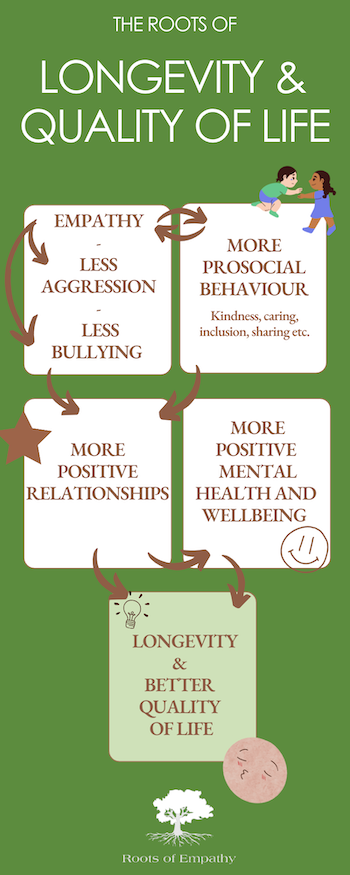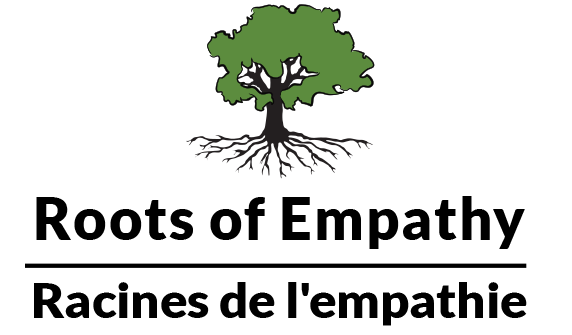Research suggests that having strong relationships with others can help promote longevity and improve overall quality of life. Positive social interactions can provide emotional support, reduce stress, and encourage healthy behaviours (Holt-Lunstad, Smith, & Layton, 2010).
Mary Gordon, Founder and President of Roots of Empathy, spoke at the New Longevity Summit organized by Ashoka and BBK in November 2022 in Balboa, Spain. There she spoke of the work Roots of Empathy does in supporting children’s mental-health and well-being and the importance of strong and reciprocal relationships.
Mary Gordon is one of the first Ashoka Canadian fellows, a Director on Ashoka’s Global Board, and an expert in parenting, early childhood development and empathy.
“Relationships are the new currency,” according to Mary Gordon. However, socio-economic inequality in childhood have been worsened by pandemic isolations, which means that many children experience and will continue to experience poor access to this ‘currency,’ especially high value relationships – a significant component to longevity. Empathy, and the Roots of Empathy and Seeds of Empathy programs, play an important role in nurturing children’s ability to build relationships.
However, socio-economic inequality in childhood have been worsened by pandemic isolations, which means that many children experience and will continue to experience poor access to this ‘currency,’ especially high value relationships – a significant component to longevity. Empathy, and the Roots of Empathy and Seeds of Empathy programs, play an important role in nurturing children’s ability to build relationships.
4 major points that break down how Roots of Empathy can improve relationships:
1. Roots of Empathy increases prosocial behaviour, which leads to better relationships. Find out more.
2. Roots of Empathy reduces aggressive behaviour and bullying, which leads to better relationships. Find out more.
3. Relationships are significant predictors of social and emotional wellbeing, positive mental health, and happiness. Find out more.
4. Positive relationships contribute to longevity. Find out more.
We’ve demonstrated that Roots of Empathy works to increase longevity and quality of life ‘Child by Child’, and that is only enabled by your support. Thank you.
The Roots of Empathy program works to break down the barriers to relationship development brought on by socio-economic inequality though its classroom program, Roots of Empathy, and its partner child care centre program, Seeds of Empathy. More broadly, the Roots of Empathy organization also works to grow the empathy movement through research symposiums and presentations to realize a future where there are more equal opportunities in childhood. We deeply appreciate your support and your consideration which helps this work continue child by child.
****
References:
“BBK New Longevity Summit.” (2022). Ashoka. https://www.ashoka.org/en-ca/newlongevitysummit
Bagwell, C. L., Newcomb, A. F., and Bukowski, W. M. (1998). Preadolescent Friendship and Peer Rejection as Predictors of Adult Adjustment. Child Development, 69, 140–153 https://doi.org/10.2307/1132076.
Bayrami, L. (May 2022). Key Findings: The Implications of Virtual Teaching and Learning in Ontario’s Publicly Funded Schools, K-12. Ontario Teachers’ Federation. http://www.otffeo.on.ca/en/wp-content/uploads/sites/2/2022/05/Key-Findings-Lisa-Bayrami-The-Implications-of-Virtual-Teaching-and-Learning-in-Ontario’s-Publicly-Funded-Schools-K-12.pdf.
Berkman LF, Syme SL. Social networks, host resistance, and mortality: a nine-year follow-up study of Alameda County residents. Am J Epidemiol. 1979;109(2):186-204. doi:10.1093/oxfordjournals.aje.a112674
Cain, G., & Carnellor, Y (2008). Roots of Empathy: A research study on its impact on teachers in Western Australia. Journal of Student Wellbeing, 2(1), 52-73.
Cohen, S., Doyle, W. J., Turner, R., Alper, C. M., & Skoner, D. P. (2003). Sociability and Susceptibility to the Common Cold. Psychological Science, 14(5), 389–395. https://doi.org/10.1111/1467-9280.01452
Connolly, P., Miller, S., Kee, F., Sloan, S., Gildea, A., McIntosh, E., & Bland, J. M. (2018). A cluster randomised controlled trial and evaluation and cost-effectiveness analysis of the Roots of Empathy schools-based programme for improving social and emotional well-being outcomes among 8-to 9-year-olds in Northern Ireland. Public Health Research.
Decker, D. M., Dona, D. P., and Christenson, S. L. (2007). Behaviorally at-risk African American students: the importance of student–teacher relationships for student outcomes. Journal of School Psychology, 45, 83–109. doi:10.1016/j.jsp.2006.09.004
Dorn, E., et al. (December 2021). COVID-19 and education: An emerging K-shaped recovery. McKinsey & Company. https://www.mckinsey.com/industries/education/our-insights/covid-19-and-education-an-emerging-k-shaped-recovery.
Harmon, K. (2010). Social Ties Boost Survival by 50 Percent. Scientific American. https://www.scientificamerican.com/article/relationships-boost-survival/.
Hartup, W. W., and Stevens, N. (1997). Friendships and adaptation in the life course. Psychological Bulletin, 121, 355–370. https://doi.org/10.1037/0033-2909.121.3.355
Hathaway, B. (February 2020). Want to live longer? Stay in school, study suggests. YaleNews. https://news.yale.edu/2020/02/20/want-live-longer-stay-school-study-suggests.
Holt-Lunstad, J., Smith, T.B., Layton, J.B. (2010). Social Relationships and Mortality Risk: A Meta-analytic Review. PLOS Medicine 7(7). https://doi.org/10.1371/journal.pmed.1000316
Horwitz, I. & M. Stevens. (2021). Reimagining Education for a New Map of Life. Stanford Education. https://longevity.stanford.edu/wp-content/uploads/2021/11/NMOL-report-11.16.21_FINAL.pdf.
Laible, D. J., Carlo, G., and Roesch S. C. (2004) Pathways to self-esteem in late adolescence: the role of parent and peer attachment, empathy, and social behaviours. Journal of adolescence, 27, 703–716. https://doi.org/10.1016/j.adolescence.2004.05.005
Lee, R. M., Draper, M., & Lee, S. (2001). Social connectedness, dysfunctional interpersonal behaviors, and psychological distress: Testing a mediator model. Journal of Counseling Psychology, 48(3), 310-318.
McGrath, K., and Van Bergen, P. (2015). Who, when, why and to what end? Students at risk of negative student-teacher relationships and their outcomes. Educational Research Review, 14, 1-17. https://doi.org/10.1016/J.EDUREV.2014.12.001.
Mulvey, K. L., Boswell, C., and Zheng, J. (2017). Causes and Consequences of Social Exclusion and Peer Rejection Among Children and Adolescents. Report on emotional & behavioral disorders in youth, 17, 71–75. https://www.ncbi.nlm.nih.gov/pmc/articles/PMC6085085/
Newland, L.A., Lawler, M.J., Giger, J.T. et al. Predictors of Children’s Subjective Well-Being in Rural Communities of the United States. Child Ind Res 8, 177–198 (2015). https://doi.org/10.1007/s12187-014-9287-x
Oberle E, Schonert-Reichl KA, Zumbo BD. Life satisfaction in early adolescence: personal, neighborhood, school, family, and peer influences. J Youth Adolesc. 2011;40(7):889-901. doi:10.1007/s10964-010-9599-1
Ragozzino, K., Resnik, H., Utne-O’Brien, M., & Weissberg, R. P. (2003). Promoting Academic Achievement through Social and Emotional Learning. Educational Horizons, 81(4), 169–171. http://www.jstor.org/stable/42925455
Santos, R.G., Chartier, M.J., Whalen, J.C., Chateau, D., & Boyd, L. (2011). Effectiveness of school-based violence prevention for children and youth: Cluster randomized controlled field trial of the Roots of Empathy program with replication and three-year follow-up. Healthcare Quarterly, 14, 80-90.
Schick, A., and Cierpka, M. (2016). Risk factors and prevention of aggressive behavior in children and adolescents. Journal for Educational Research Online, 8, 90-109. doi: 10.25656/01:12034
Schonert-Reichl, K. A., Smith, V., Zaidman-Zait, A., & Hertzman, C. (2012). Promoting children’s prosocial behaviours in school: Impact of the “Roots of Empathy” program on the social and emotional competence of school-aged children. School Mental Health 4(1), 1-12.
Statistics Canada. (2020). Health Reports: Life expectancy differs by education and income levels. https://www150.statcan.gc.ca/n1/daily-quotidien/200115/dq200115c-eng.htm
Tremblay, R. (2004). Physical aggression during early childhood: trajectories and predictors. Pediatrics, 114, e43–e50. https://doi.org/10.1542/peds.114.1.e43.
Vila, J. (Sept 2021). Social Support and Longevity. Frontiers Psychology, (13). https://doi.org/10.3389/fpsyg.2021.717164.


